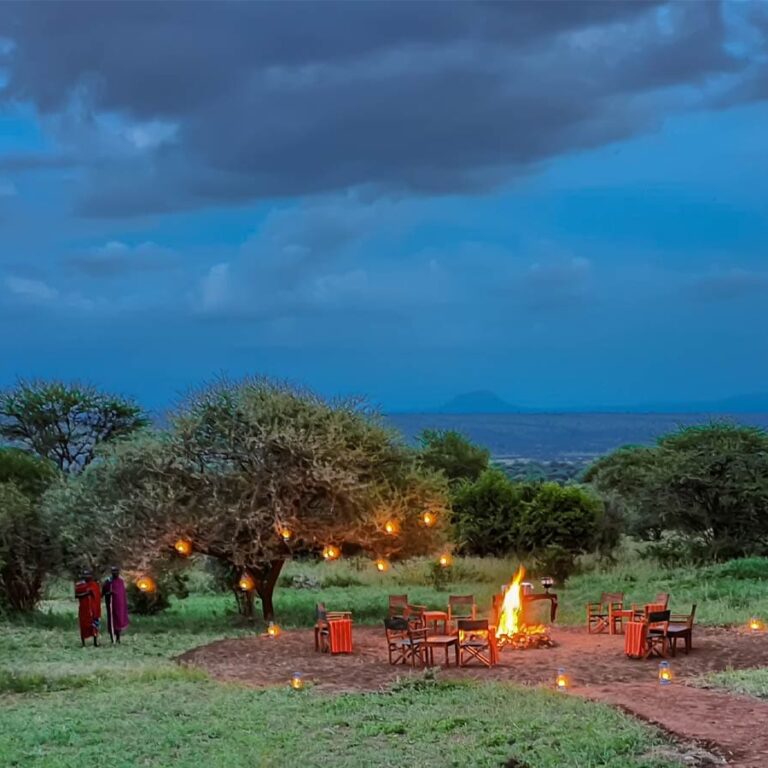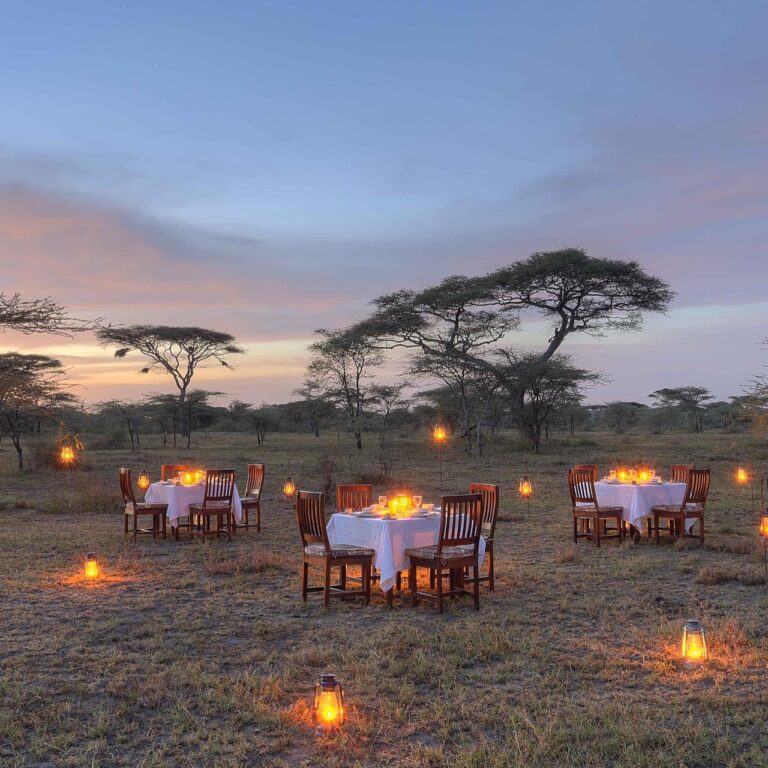Embarking on a safari in Tanzania is a once-in-a-lifetime adventure that immerses you in the breathtaking wilderness of East Africa. From the vast plains of the Serengeti National Park to the iconic Ngorongoro Crater, Tanzania is one of the most sought-after safari destinations in the world. For a Tanzania safari, do listen to your guide, stay in the vehicle, pack neutral-colored clothing, use binoculars, and respect park rules. Avoid making loud noises, feeding animals, littering, or wearing bright colors like blue, red, or orange, as these can disturb wildlife and attract insects. It’s also crucial to stay hydrated, wear appropriate footwear, and keep personal items secure, especially from monkeys. But to ensure a safe, respectful, and unforgettable experience, it’s crucial to follow proper safari etiquette. Here’s your comprehensive guide on what to do and avoid during your Tanzanian safari journey.
✅ Essential Do’s on a Tanzania Safari
Essential do’s for a Tanzania safari include respecting wildlife by maintaining a safe distance and staying quiet, always following your guide’s instructions, packing smart with essentials like sunscreen, insect repellent, and binoculars, and being respectful of local culture. Proper preparation and etiquette are crucial for a safe and rewarding Luxury Tanzania Safari Tours experience.
Listen to Your Guide
Your safari guide is your lifeline in the bush. They are trained professionals with years of Tanzania safari packages experience navigating the terrain and understanding animal behavior. Always listen carefully to their instructions, whether it’s about where to stand, how to behave near wildlife, or safety protocols during game drives and walking safaris. Their primary goal is to ensure your safety and maximize your wildlife encounters.
Stay in the Vehicle During Game Drives
Wild animals see vehicles as neutral objects, but once you step out, you become a threat or prey. Never leave the safari vehicle unless explicitly told it’s safe. Even the calmest-looking elephant or lion can become aggressive if they feel threatened. Staying inside the vehicle helps you avoid dangerous encounters and keeps the environment undisturbed.
Wear Neutral-Colored Clothing
Colors like khaki, olive, beige, and brown help you blend into the natural surroundings. Bright colors and white can alert animals or attract unwanted insects, while dark blue and black are known to attract tsetse flies, which can bite. Wearing neutral tones also shows respect for the wilderness and helps you get closer to animals without disturbing them.
Use Binoculars for Better Wildlife Viewing
Don’t expect animals to always be right next to the road. A good pair of binoculars is essential for spotting distant lions, cheetahs lounging in the grass, or birds high up in acacia trees. Most guides will have a pair, but having your own ensures you never miss a moment. Investing in high-quality optics will enhance Tanzania safari best time your entire safari experience.
Keep Noise to a Minimum
Loud conversations, shouting, or playing music can easily scare animals away. Safari vehicles are designed to approach wildlife silently. To preserve the serenity of the environment and not disturb other guests or wildlife, keep your voice low and turn your phone to silent mode. Silence often brings the most magical Tanzania safari and Zanzibar packages sightings.
Dispose of Waste Properly
Tanzania’s national parks are protected environments. Littering is prohibited and can cause harm to animals and the ecosystem. Always take your trash back to camp or use designated waste bins. Even biodegradable items like fruit peels can disrupt the natural diet of wildlife and alter animal behavior.
Stay Hydrated
Safari days can be long, dusty, and hot, especially in the dry season. Carry a refillable water bottle and drink water regularly to avoid dehydration. Many safari vehicles come equipped with coolers and water, but it’s wise to have your own supply at all times.
Pack Smart for the Bush
Prepare for various temperatures and conditions. Mornings can be chilly, afternoons blazing hot, and evenings cool. Essentials include a wide-brim hat, sunscreen, insect repellent, sunglasses, a waterproof jacket, and sturdy walking shoes. Keep valuables to a minimum and bring soft-sided luggage for ease of transport.
Wake Up Early for Game Drives
Early morning safaris offer the best wildlife sightings. Predators are often active before the heat of the day, and the golden morning light creates stunning photo opportunities. Resist the urge to sleep in — the African bush comes alive at dawn.
Be Patient and Observant
Safari is not a zoo. Sometimes you’ll drive for miles without seeing much, but patience pays off. Observing the subtle movements of grass or bird alarms can lead to incredible sightings. Trust the guide’s instincts and enjoy the process of searching for animals in their natural habitat.
❌ Critical Don’ts on a Tanzania Safari
Critical don’ts on a Tanzania safari include approaching or feeding animals, making loud noises or sudden movements, leaving your vehicle unless your guide says it’s safe, and littering. You should also avoid taking photos of people without permission, dressing inappropriately, and engaging in aggressive bargaining or displays of wealth.
Don’t Feed the Animals
Feeding wild animals is not only dangerous but can also disrupt their natural feeding patterns and make them dependent on humans. It also increases the risk of aggressive behavior. Never offer food, no matter how friendly or harmless an animal might seem. Experience the wild in style with luxury bespoke Tanzania safari lodges and camps, offering personalized service, gourmet dining, and breathtaking views. Nestled in iconic locations like the Serengeti, Ngorongoro, and Tarangire, these exclusive retreats blend comfort with authenticity. Enjoy private game drives, sundowners, and spa treatments amid nature. Each lodge and tented camp is uniquely designed to provide an unforgettable, immersive safari experience while supporting conservation and local communities. Perfect for honeymoons, family getaways, or romantic escapes.
Don’t Make Loud Noises or Sudden Movements
Noise and fast motions can scare wildlife or provoke an aggressive response. Avoid clapping, yelling, or making sudden hand gestures when near animals. This is especially important during close-range encounters with elephants, buffalo, or predators.
Don’t Litter the Environment
Do not litter on a Tanzania safari to protect the environment and wildlife by properly disposing of all waste. Carry all trash with you, including food scraps, and dispose of it in designated bins at lodges or with your guide. This is crucial because litter can harm animals, disrupt their feeding habits, and damage the ecosystem. Whether it’s a wrapper, tissue, or bottle, every piece of litter has the potential to harm wildlife or pollute ecosystems. Always practice Leave No Trace principles — carry out what you carry in.
Don’t Wear Bright or Flashy Colors
You should not wear bright or flashy colors on a Tanzania safari because they can make you stand out to animals and may attract tsetse flies, which are particularly drawn to dark blue and black. The best colors to wear are neutral, earthy tones like khaki, beige, olive green, and light brown to blend in with your surroundings. Fluorescent or bright-colored clothing can alarm animals and attract insects. Steer clear of reds, oranges, whites, and dark blues. Stick to muted tones that keep you discreet and safe.
Don’t Touch or Approach Wildlife
Getting too close to wildlife is not only dangerous but also highly disrespectful. Never attempt to touch, chase, or lure animals for a better photo. Respect their space and remember — you are a guest in their home. You should not touch or approach wildlife on a Tanzania safari to ensure your safety and their well-being. Wild animals can be unpredictable and may react defensively if you get too close, which can cause them stress and disturb their natural behavior. Always follow your guide’s instructions, stay inside your vehicle unless permitted, and use binoculars or a zoom lens to observe animals from a respectful distance.
Don’t Disregard Local Customs and Traditions
Tanzania is rich in cultural heritage. Always be respectful when interacting with local communities. Learn a few basic Swahili phrases, ask before taking photos of people, and dress modestly when visiting villages. This shows appreciation and respect for local culture. As a trusted local operator based in Arusha, Foot Slopes Tours and Safaris offers authentic Tanzanian Safari Experiences, unparalleled insight, and access to Tanzania’s hidden gems.
Don’t Expect a Strict Schedule
On a Tanzanian safari, don’t expect a strict schedule; instead, prioritize respecting wildlife by staying quiet, not feeding them, and keeping your distance. Crucially, avoid littering, wearing bright colors or strong perfumes, taking photos of people without permission, and driving off-road. Additionally, be prepared for potential delays in travel and service, as things may not run on time. Africa moves at its own pace. Delays can happen due to weather, road conditions, or animal activity. Flexibility is essential. Embrace the “pole pole” (slowly, slowly) lifestyle and savor every moment, even the unexpected ones.
Don’t Leave Personal Items Unattended
Camps and lodges are generally safe, but animals (especially baboons and monkeys) are known to snatch unattended bags or food. Always the ultimate Tanzania Safari Guide Do’s & Don’ts: secure your belongings, and don’t leave valuables out in the open. You should not leave personal items unattended on a Tanzania safari to prevent theft, loss, or damage, especially in crowded areas and at lodges with unfenced Tanzania safari adventures wildlife. Always secure valuables like your passport, cash, and expensive electronics in a safe place, such as a Tanzania safari resort hotel safe or a guide’s care, and be cautious of your belongings even in well-traveled tourist spots.
Don’t Photograph People Without Permission
Always ask before taking pictures of local Maasai, Hadzabe, or other community members. Some may find it offensive or believe photography steals part of their spirit. Politeness goes a long way, and offering a small tip in exchange for photos is appreciated. Don’t Take Pictures Without Consent. This practice ensures that people are aware of being photographed and have the opportunity to provide their consent. For many individuals, the ultimate Tanzania Safari Guide Do’s & Don’ts being photographed without consent can feel intrusive.
Photo Etiquette – Prepare for your Safari
For safari photo etiquette, always ask for permission before photographing people, avoid paying for photos, and be respectful of the Maasai culture. For wildlife, stay inside the vehicle, use a silent camera mode if possible, avoid using flash, and maintain a safe distance. Prepare for your safari by researching your destination, packing appropriate gear and clothing, and practicing with your camera.
Do’s and Don’ts to be Considered for Perfect Tanzania Safari Tours
Do listen to your guide, stay in the vehicle, wear neutral colors, and respect wildlife and local customs. Pack wisely, stay hydrated, and be patient during game drives the ultimate Tanzania Safari Guide Do’s & Don’ts. Don’t feed animals, make loud noises, litter, or wear bright clothing. Avoid touching wildlife or wandering off alone. Always ask permission before photographing locals. Following these essential tips ensures a safe, respectful, and unforgettable Tanzania safari experience, while supporting wildlife conservation and cultural sensitivity.
Tips: For a perfect Tanzania safari, do choose a reputable tour company, listen to your guide, pack light with neutral-colored layers, and bring essentials like binoculars and sunscreen. The Ultimate Tanzania Safari Guide Do’s & Don’ts. Don’t make loud noises, feed or approach wildlife, litter, drink tap water, or carry large amounts of cash. Always follow your guide’s instructions for safety and responsible wildlife viewing.
Safari-Etiquette-and-rules: Dress Code, Tipping, Do’s and Don’ts
For a safari, dress in neutral colors like khaki or olive green, wear sturdy closed-toe shoes, and pack layers for changing temperatures the ultimate Tanzania Safari Guide Do’s & Don’ts. Do listen to your guide, stay in the vehicle, be quiet, and respect the environment by not littering or feeding animals. Don’t wear bright colors, make loud noises, or try to interact with wildlife. For tipping, tipping guidelines for Safaris, a general guide is to give your safari guide $10–$15 per person per day at the end of the trip, and you can leave a smaller amount (around $2–$4) for lodge staff in a communal tip box.
Serengeti Safari Tour Dos and Don’ts: Etiquette and Conservation Tips
Do follow your guide’s instructions, stay inside the vehicle, and wear neutral colors to respect wildlife. Use binoculars, stay quiet, and dispose of waste properly. Don’t feed or approach animals, make loud noises, or litter. Avoid bright clothing and never photograph locals without permission. Embrace early starts and be patient. Respecting these guidelines helps protect Serengeti’s ecosystem, supports conservation, and ensures a safe, unforgettable safari experience for all. On a Serengeti safari, do stay inside your vehicle, listen to your guide, and dress in neutral colors, while don’t feeding the animals, making loud noises, or littering.
It’s crucial to respect wildlife by keeping a safe distance and avoiding sudden movements, and to respect local culture by asking permission before taking photos of people. For conservation, pack out all your trash and stay on marked paths to protect the fragile ecosystem.
Do’s and Don’ts for Responsible Wildlife Viewing
Always listen to your guide, keep a safe distance, and stay quiet to avoid disturbing animals. Use binoculars instead of approaching wildlife, and wear neutral colors to blend in. Do not feed, touch, or chase animals, and never litter or leave the vehicle without permission. Respect local customs and ask before taking photos of people. Responsible behavior ensures safety, conservation, and a truly the ultimate Tanzania Safari Guide Do’s & Don’ts enriching wildlife experience for everyone.
The Ultimate Safari Guide for First-Time Travelers
First-time safari travelers should follow their guide’s instructions, pack light with neutral clothing, and bring essentials like binoculars, sunscreen, and insect repellent. Stay in the vehicle, keep noise low, and respect wildlife by observing from a distance. Avoid feeding animals, littering, or wearing bright colors. Be flexible with schedules and embrace early mornings. Respect local customs and always ask before taking photos. These tips ensure a safe, respectful, and memorable safari adventure.
Tipping and clothing for Tanzania safaris?
For a Tanzania safari, tip your guide about $10-$20 per person per day tips for African safari and staff around $5-$10 per person per day. Safari guide tips Tanzania, preferably in USD cash at the end of the trip. For clothing, pack lightweight, breathable layers in neutral colors like khaki, olive, or beige, and bring a light jacket for cool mornings and evenings. Avoid bright colors like white, red, and yellow, as well as dark colors like black and blue, which can attract insects.
Ngorongoro Crater Safari Tour Dos and Don’ts: Do’s
Respect animals’ right of way and follow your guide’s instructions, stay on designated roads and picnic spots, and wear comfortable, neutral-colored clothing. Don’ts: Do not litter, smoke outside of designated areas, make loud noises to attract animals, or feed any wildlife. Also, avoid night game drives or leaving the car unattended, especially after dark.
Climbing Mount Kilimanjaro the Dos And Don’ts
The Ultimate Guide to Going on an African Safari
The 10 Best Tanzania Safaris 2025/2026
10 Mistakes To Avoid On A Safari, According To Experts
What not to wear on Safari in Tanzania
📌 Final Thoughts: Make the Most of Your Tanzania Safari
A safari in Tanzania is an awe-inspiring journey filled with unforgettable landscapes, unique wildlife, and rich cultural experiences. By following these do’s and don’ts, you not only stay safe and respect the environment, but also help preserve the magic of the wild for future generations. The key to a successful safari lies in preparation, respect, patience, and open-mindedness.
Whether you’re tracking the Great Migration, watching elephants roam in Tarangire, or admiring the flamingos in Lake Manyara, every moment offers a chance to connect deeply with nature. For those who plan wisely and act responsibly, Tanzania rewards with wonders that words can hardly describe.








